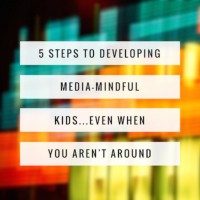 My kids are 10 and 7. The age when I’m starting to let them hang with friends a little later and sleep overnight with trusted families. And really they’re at school more than they are at home.
My kids are 10 and 7. The age when I’m starting to let them hang with friends a little later and sleep overnight with trusted families. And really they’re at school more than they are at home.
I have to admit that I worry a little when they aren’t down the hall or in my yard. Frankly, I’d love to wrap them head to toe in bubble wrap.
But really my biggest fear isn’t that they’ll bump a knee or even break a bone. It’s more about what might find its way into their minds through the ever present pressure of media and technology. Know what I mean?
When our kids are young, it’s easy to control where they go, what they read and see, and what they put in front of their eyes. After all a baby can’t turn on a television or read a questionable book under the covers.
But as kids grow, it’s impossible to have complete control…even if we think we do.
[tweetthis display_mode=”button_link”] As kids grow, it’s impossible to have complete control…even if we think we do. [/tweetthis]
So instead of pretending we can wrap our child’s mind in metaphorical bubble-wrap, perhaps we should equip them to combat peer pressure and make good decisions when Mom and Dad aren’t there to help.
- Show kids why you choose the movies and books you do and teach them to do the same. Visit your favorite media review sites and show your kids what’s acceptable and the reasons why some entertainment isn’t good for them. Explain the rating systems and teach your children how to use the systems as a first line of defense. You’d be surprised what books and movies are recommended by teachers and friends.
- Teach your child to trust their instincts. If something feels off or makes them nervous, they should leave. Call a parent or trusted adult. NOW.
- Give your child permission to call any time, any place. It goes without saying that your kids should know your phone number(s). Then make sure you tell them you won’t be angry, annoyed, or upset if they call you because something is happening that they don’t like. Don’t assume they know. Tell them.
- Institute a plan for your child to leave without embarrassment. This is a great tip from a friend. No child wants to call Mommy because a movie is too scary, too graphic, or too whatever. Instead, come up with signal words. Maybe your child can tell you she doesn’t feel quite right (She doesn’t feel right about staying!). Or maybe before the child leaves, tell him that there’s a project that you might need help on, but only if he doesn’t want to stay at the friend’s house. Then tell him if he’s uncomfortable to call and ask if you need help with that project. That’s a signal to you that he needs to be picked up immediately.
- Don’t make your child regret calling you. When you arrive at the friend’s house, don’t make a big deal about it. Collect your kid’s things and leave. When you drive your child home, calmly compliment him for his wisdom, ask if he has any questions or want to talk about it. Then, if there are no other warning signs, MOVE ON! Dwelling on the bad choice their friends or friends’ parents made will only make your child hesitate to call you next time.
Armed with these tips you’ll be one step closer to empowering your child to make wise media choices independent of your parental influence.
Comments? Questions? Leave them here. We’d love to hear from you.
Don’t miss a single Dove Parenting Blog. Subscribe to the Dove Foundation feed or monthly newsletter.




